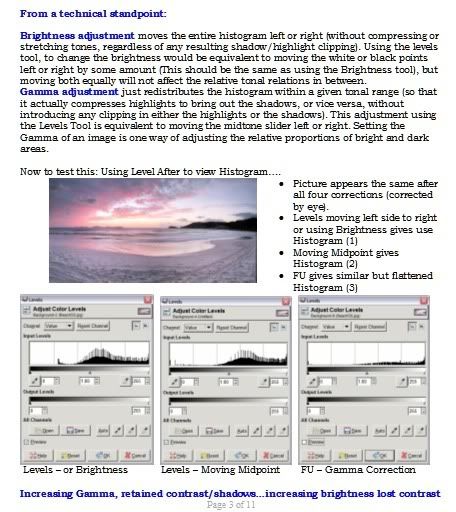pretty much all photo editing SW have brightness/gamma adjustment..
however, I am still struggling to understand what Gamma is. and what gamma correction will do.
Cheers
vincent
 Helpful Posts: 0
Helpful Posts: 0
Results 1 to 14 of 14
-
22nd May 2008, 07:30 PM #1
Understanding brightness and gamma
-
25th May 2008, 12:20 AM #2

- Join Date
- May 2008
- Location
- Pittsburgh PA, St. Augustine FL
- Posts
- 136
Re: brightness and Gamma
I probably don't know more than you do...but I will tell how I think about it......
I normally think of Gamma and Brightness being some what the same....I do understand that changing Gamma does also change the color channels ..... but
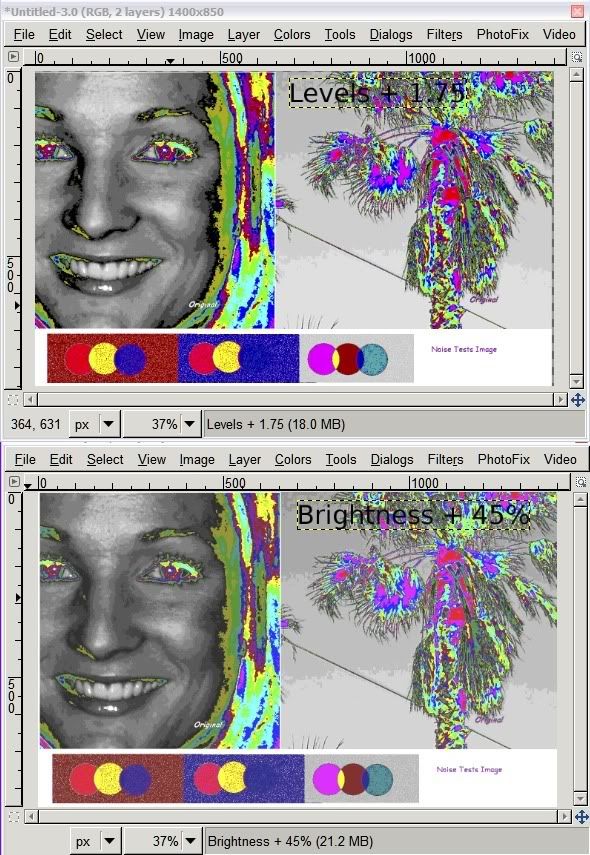
A sample (Test Image mapped to Pallet) shows somewhat the same results whether increasing brightness or increasing Gamma using levels.....I think of Gamma as the middle value in the histogram or average value
Now someone, with more technical competence, can correct my understanding and we both can learn something...Last edited by willgoss; 25th May 2008 at 12:22 AM.
-
25th May 2008, 02:29 AM #3
Re: brightness and Gamma
Here are a couple of interesting links with more information than most of us care about, but with the correct terminology and explanations:
http://www.poynton.com/notes/colour_.../GammaFAQ.html
http://www.poynton.com/notes/colour_.../ColorFAQ.html
It's a long time since I took my physics and engineering courses, but I'll try to summarize my understanding.
The way colour is perceived by any receiver (whether the eye, film, digital sensor, monitor screen etc.) varies with the wavelength (colour) and the intensity (brightness) of the light. Simply, different materials respond to different light in different ways. Gamma is an expression of this different response.
The relationship between the original light and the recorded voltage on the camera sensor, or between the voltage on the computer monitor signal and the chemicals that create the visible light, for example, is refered to as the "gamma". Gamma adjustment is a correction to make the final image appear the same as the original, despite the non-linear characteristics of the technology used.
What does this mean to my pictures? Another website has an interesting quote: "Setting the Gamma of an image is one way of adjusting the relative proportions of bright and dark areas – much the same way as in the midtones example"
http://www.northlight-images.co.uk/t...ial_gamma.html
So, while adjusting brightness and gamma may produce similar results in most circumstances, gamma is actually changing the relative brightness along a curve between dark and white, whereas brightness changes the value uniformly (and thus introduces its own perceptual gamma correction).
I hope that helps a little, and has not just confused you more!
Last edited by SRH; 28th May 2008 at 04:26 AM.
-
25th May 2008, 05:50 AM #4

- Join Date
- May 2008
- Location
- Pittsburgh PA, St. Augustine FL
- Posts
- 136
Re: brightness and Gamma
Yes this is fun...I did look at a lot of reference material...much of it is like my engineering references....they give guidance but not used very much.....I should have included an actual set of histograms......
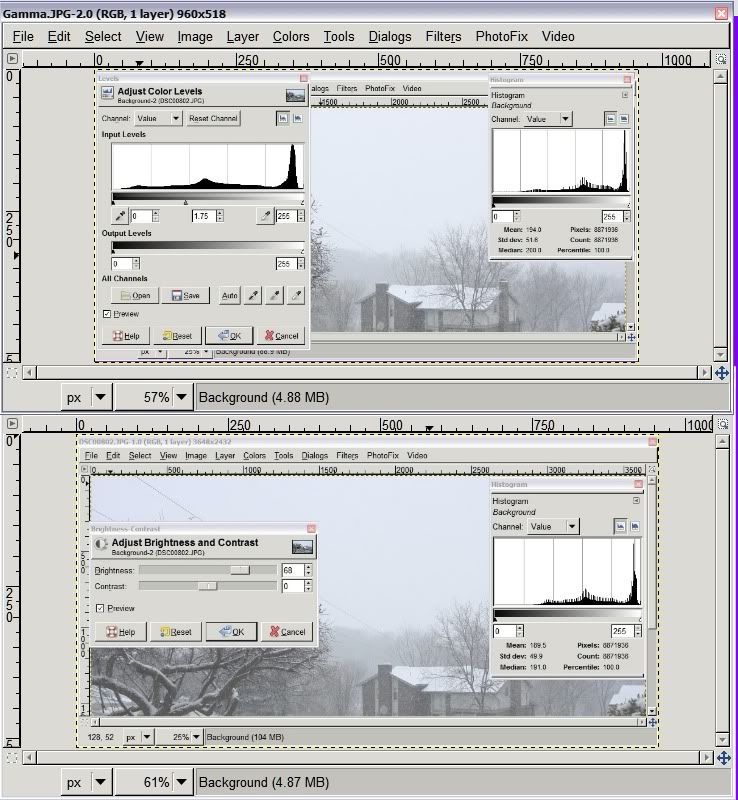
In my case I am only interested to what happens to my image.....perhaps at some time within color management work.......I do note differences in how the Levels, middle or Gamma adjustment, gives different results when using different Graphics programs.
But the question was not mine....I just played around having a little fun..proving nothing...but I will explore further your (SRH) references....
Follow-Up....The test were based on the Gimp Levels control.....It occurred that the control may simply use brightness in adjusting the Gamma or Midpoint setting....therefore...
I tested the same on Paint Shop Pro X2 and the results were different....so I moved on to the Filters Unlimited Plugin which has both Brightness and Gamma adjustment effects......I ran this on both programs and for sure I got different results from the Gimp Levels.....
I note that in increasing Gamma I saw little change in contrast...retaining shadows...while increasing brightness lost contrast....so I now know it doesn't matter in Gimp when I use Levels as it is the same as Brightness.... but using a Gamma only correction, such as in PSPP or FU will better retain Contrast (slightly).Last edited by willgoss; 25th May 2008 at 04:30 PM.
-
27th May 2008, 03:29 PM #5Administrator

- Join Date
- Apr 2008
- Location
- California, USA
- Posts
- 1,473
- Real Name
- Sean
Re: Understanding brightness and gamma
Another way to look at it is that brightness moves the entire histogram left or right (without compressing or stretching tones, regardless of any resulting shadow/highlight clipping), whereas gamma adjustment just redistributes the histogram within a given tonal range (so that it actually compresses highlights to bring out the shadows, or vice versa, without introducing any clipping in either the highlights or the shadows). If you were using the levels tool, changing the brightness would be equivalent to moving the white and black points left or right by an equal amount (so as not to affect the relative tonal relations in between). Similarly, for gamma this is equivalent to moving the midtone slider left or right.
-
27th May 2008, 07:58 PM #6

- Join Date
- May 2008
- Location
- Pittsburgh PA, St. Augustine FL
- Posts
- 136
-
28th May 2008, 03:21 AM #7
Re: Understanding brightness and gamma
damn, I hate when that happened...people answering questions with details analysis, examples, etc...and then they hijack the thread!....But the question was not mine
Thanks all for the good feedback (which I still have to look through)...I think I understand now what both adjustments do.
-
29th May 2008, 04:06 PM #8
Re: Understanding brightness and gamma
following the link that SRH posted, I also found he has a pdf on setting monitor brightness/contrast on monitor and the diagram summarize what McQ basically said in term of moving the histogram one way or another..
http://www.poynton.com/PDFs/Brightness_and_Contrast.pdf
-
30th May 2008, 04:35 AM #9
Re: Understanding brightness and gamma
Thanks for that find, atvinnys. I was inspired to surf Poynton's site some more, and came across
http://www.poynton.com/PDFs/Rehabilitation_of_gamma.pdf
Most of Poynnton's work is related to computer hardware, but his principles apply to all imaging systems. I found the following excerpt interesting.
"JPEG and other lossy image compression algorithms depend on
discarding information that won’t be perceived. It is vital that the data
presented to a JPEG compressor be coded in a perceptually-uniform
manner, so that the discarded information has minimal perceptual
impact. In practice, JPEG works well only on nonlinearly-coded
(gamma-corrected) image data."
Now I'm wondering how my E3 handles gamma prior to creating a JPEG? (Actually, I'm quite happy with the camera conversion.)
-
30th May 2008, 05:11 AM #10
Re: brightness and Gamma
After reading all these posts, and viewing a whole bunch of stuff on the web, I finally decided to look at the help file in PhotoShopElements6.
 In the glossary: gamma adjustment--The contrast resulting from darkening or lightening the midtones of an image. When you adjust the gamma, you change the brightness of the midtones without substantially affecting the highlights and shadows.
In the glossary: gamma adjustment--The contrast resulting from darkening or lightening the midtones of an image. When you adjust the gamma, you change the brightness of the midtones without substantially affecting the highlights and shadows.
This is pretty much what you said originally, willgoss.
-
10th July 2008, 07:49 PM #11

- Join Date
- May 2008
- Location
- Madrid (Spain)
- Posts
- 169
Re: Understanding brightness and gamma
To those familiar with curves, it can be very clarifying to see how Photoshop tools work in terms of an input/output curve.
I have calculated these curves after applying the referred Photoshop option to a test image containing all possible input levels and looking at the corresponding output values produced. First two are gamma and bright:
Standard Gamma 2.2

Bright +40

Contrast +40
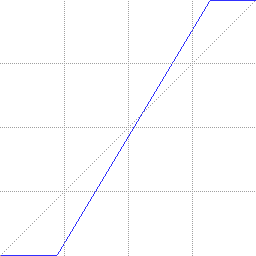
Levels adjustment tool

Lights & Shadows adjustment 70%
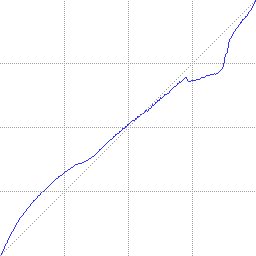
Exposure +2

It is easy to see how absolutely not recommended is Photoshop's contrast tool to control contrast in our photographs since it clips both shadows and highlights. A 'S' shaped curve is much preferred.
(Correction): In the Exposure control, the apparent non-linearity near 0 is due to the sRGB non-pure gamma near 0.
Best regards.Last edited by _GUI_; 12th July 2008 at 11:11 AM.
-
10th July 2008, 09:11 PM #12
Re: Understanding brightness and gamma
wow, that's some good analysis.
thanks a bunch.
-
22nd August 2008, 08:46 AM #13

- Join Date
- Jun 2008
- Location
- The Netherlands
- Posts
- 95

Re: Understanding brightness and gamma
Thank you _GUI_ .
That's just what i needed for a better understanding.
-
24th August 2008, 09:54 AM #14

- Join Date
- Aug 2008
- Location
- Tokyo
- Posts
- 22
Re: Understanding brightness and gamma
_GUI_,
I've seen this illustrated before, but I've never seen it confirmed by analysis. Nice work!
Regards,
Mike


 Reply With Quote
Reply With Quote